| Listing 1 - 10 of 16 | << page >> |
Sort by
|
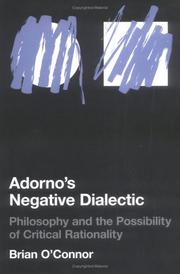
ISBN: 0262151103 Year: 2004 Publisher: Cambridge-London The MIT Press
Abstract | Keywords | Export | Availability | Bookmark
 Loading...
Loading...Choose an application
- Reference Manager
- EndNote
- RefWorks (Direct export to RefWorks)
Dialectic --- Philosophy --- Mental philosophy --- Humanities --- Polarity --- Polarity (Philosophy) --- Adorno, Theodor W., --- Négativité (philosophie) --- Ontologie --- Philosophie

ISBN: 9042011386 9401201005 1417564288 9781417564286 Year: 2004 Publisher: Amsterdam Rodopi
Abstract | Keywords | Export | Availability | Bookmark
 Loading...
Loading...Choose an application
- Reference Manager
- EndNote
- RefWorks (Direct export to RefWorks)
Written across the disciplines of art history, literature, philosophy, sociology, and theology, the ten essays comprising the collection all insist on multidimensional definitions of evil. Taking its title from a moment in Shakespeare's Tempest when Prospero acknowledges his responsibility for Caliban, this collection explores the necessarily ambivalent relationship between humanity and evil. To what extent are a given society's definitions of evil self-serving? Which figures are marginalized in the process of identifying evil? How is humanity itself implicated in the production of evil? Is evil itself something fundamentally human? These questions, indicative of the kinds of issues raised in this collection, seem all the more pressing in light of recent world events. The ten essays were originally presented at the First Global Conference on Perspectives on Evil and Human Wickedness, held in March 2000 in Lady Margaret Hall, Oxford University.
Good and evil. --- Evil --- Wickedness --- Ethics --- Philosophy --- Polarity --- Religious thought
Book
ISBN: 0262280884 9780262280884 Year: 2004 Publisher: Cambridge, Mass. MIT Press
Abstract | Keywords | Export | Availability | Bookmark
 Loading...
Loading...Choose an application
- Reference Manager
- EndNote
- RefWorks (Direct export to RefWorks)
The purely philosophical concerns of Theodor W. Adorno's negative dialectic would seem to be far removed from the concreteness of critical theory; Adorno's philosophy considers perhaps the most traditional subject of "pure" philosophy, the structure of experience, whereas critical theory examines specific aspects of society. But, as Brian O'Connor demonstrates in this highly original interpretation of Adorno's philosophy, the negative dialectic can be seen as the theoretical foundation of the reflexivity or critical rationality required by critical theory. Adorno, O'Connor argues, is committed to the "concretion" of philosophy: his thesis of nonidentity attempts to show that reality is not reducible to appearances. This lays the foundation for the applied "concrete" critique of appearances that is essential to the possibility of critical theory. To explicate the context in which Adorno's philosophy operates--the tradition of modern German philosophy, from Kant to Heidegger--O'Connor examines in detail the ideas of these philosophers as well as Adorno's self-defining differences with them. O'Connor discusses Georg LucA cs and the influence of his "protocritical theory" on Adorno's thought; the elements of Kant's and Hegel's German idealism appropriated by Adorno for his theory of subject-object mediation; the priority of the object and the agency of the subject in Adorno's epistemology; and Adorno's important critiques of Kant and the phenomenology of Heidegger and Husserl, critiques that both illuminate Adorno's key concepts and reveal his construction of critical theory through an engagement with the problems of philosophy.
Philosophy. --- Dialectic. --- Philosophy --- Dialectic --- Philosophy & Religion --- Adorno, Theodor W., --- Mental philosophy --- Polarity --- Polarity (Philosophy) --- Humanities --- PHILOSOPHY/General --- SOCIAL SCIENCES/Political Science/Political & Social Theory
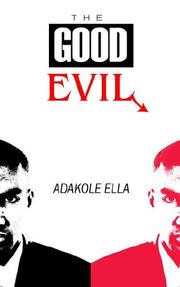
ISBN: 1844263266 020360251X 1134319037 1280064358 0203489128 9780203489123 0415332893 9781134318988 9781134319022 9781134319039 9780415332880 9780415332897 1134319029 9781844263264 9781280064357 Year: 2004 Publisher: London New York Routledge
Abstract | Keywords | Export | Availability | Bookmark
 Loading...
Loading...Choose an application
- Reference Manager
- EndNote
- RefWorks (Direct export to RefWorks)
In Good and Evil: An Absolute Conception, Raimond Gaita draws moral philosophy away from the academic study of ethics and considers instead how real people actually talk and feel about morality, using good and evil as examples.
Good and evil. --- Philosophy. --- Mental philosophy --- Humanities --- Evil --- Wickedness --- Ethics --- Philosophy --- Polarity --- Religious thought

ISBN: 1405114320 Year: 2004 Publisher: Oxford : Blackwell,
Abstract | Keywords | Export | Availability | Bookmark
 Loading...
Loading...Choose an application
- Reference Manager
- EndNote
- RefWorks (Direct export to RefWorks)
Cell differentiation. --- Plant and Crop Sciences. Botany --- Polarity (Biology). --- Plant Physiology.
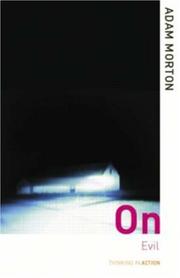
ISBN: 0415305195 0415305187 0203704126 9780203704127 9786610077755 6610077754 9780415305181 9781134406067 9781134406104 9781134406111 9780415305198 1280077751 113440610X 0203352130 1134406118 1283962640 Year: 2004 Publisher: New York Routledge
Abstract | Keywords | Export | Availability | Bookmark
 Loading...
Loading...Choose an application
- Reference Manager
- EndNote
- RefWorks (Direct export to RefWorks)
Evil has long fascinated psychologists, philosophers, novelists and playwrights but remains an incredibly difficult concept to talk about. On Evil is a compelling and at times disturbing tour of the many faces of evil. What is evil, and what makes people do awful things? If we can explain evil, do we explain it away? Can we imagine the mind of a serial killer, or does such evil defy description? Does evil depend on a contrast with good, as religion tells us, or can there be evil for evil's sake?Adam Morton argues that any account of evil must help us understand three things: w
Metaphysics --- General ethics --- Good and evil. --- Good and evil --- Evil --- Wickedness --- Ethics --- Philosophy --- Polarity --- Religious thought --- Ethics.
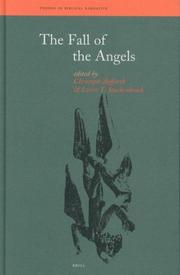
ISBN: 128091470X 9786610914708 9047404335 1429409932 9781429409933 9789004126688 9004126686 9781280914706 6610914702 9789047404330 9004126686 Year: 2004 Publisher: Leiden Boston Brill
Abstract | Keywords | Export | Availability | Bookmark
 Loading...
Loading...Choose an application
- Reference Manager
- EndNote
- RefWorks (Direct export to RefWorks)
The fall of the angels is one of the biblical narratives which, above all in the history of the bible's reception, have developed an extraordinary effect: In the biblical canon they appear just as hints (Gen. 6; Isaiah 14; Apocalypse 12). Little concern for the text as well as a tradition and reception not covered by the canon makes the narrative grow and change considerably, as well as freely negotiate in the popular media of iconography, liturgy and theatre. As a completed narrative the fall of the angels appears only in the literature of the apocalyptic movement. The so-called Henoch tradition provides revelations about the cosmos and the secrets of Heaven and Earth. Through this mystery our present world is coded as a battle between good and evil.
Demonology --- Good and evil --- Evil --- Wickedness --- Ethics --- Philosophy --- Polarity --- Religious thought --- Demonology, Christian --- Demons --- Evil spirits --- Spirits --- Spiritual warfare --- History of doctrines. --- Religious aspects --- Christianity
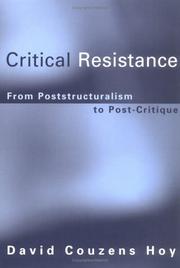
ISBN: 0262083302 9780262083300 Year: 2004 Publisher: Cambridge (Mass.): MIT Press,
Abstract | Keywords | Export | Availability | Bookmark
 Loading...
Loading...Choose an application
- Reference Manager
- EndNote
- RefWorks (Direct export to RefWorks)
Critical theory. --- Opposition, Theory of. --- Critical theory --- Opposition, Theory of --- Contrariety --- Critical social theory --- Critical theory (Philosophy) --- Critical theory (Sociology) --- Negative philosophy --- Philosophy --- Polarity --- Psychology --- Criticism (Philosophy) --- Philosophy, Modern --- Rationalism --- Sociology --- Frankfurt school of sociology --- Socialism
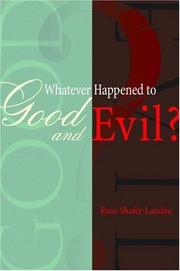
ISBN: 0195168739 9780195168730 Year: 2004 Publisher: New York, N.Y. Oxford University Press
Abstract | Keywords | Export | Availability | Bookmark
 Loading...
Loading...Choose an application
- Reference Manager
- EndNote
- RefWorks (Direct export to RefWorks)
Ethics --- Good and evil. --- 216 --- Deontology --- Ethics, Primitive --- Ethology --- Moral philosophy --- Morality --- Morals --- Philosophy, Moral --- Science, Moral --- Philosophy --- Values --- Evil --- Wickedness --- Polarity --- Religious thought --- Goed en kwaad --- Philosophy and psychology of culture --- General ethics --- Good and evil
Book
ISBN: 9021139723 Year: 2004 Publisher: Zoetermeer Meinema
Abstract | Keywords | Export | Availability | Bookmark
 Loading...
Loading...Choose an application
- Reference Manager
- EndNote
- RefWorks (Direct export to RefWorks)
Good and evil --- 216 --- Evil --- Wickedness --- Ethics --- Philosophy --- Polarity --- Religious thought --- Biblical teaching --- Religious aspects --- Christianity --- History of doctrines --- Religious aspects&delete& --- Judaism&delete& --- Goed en kwaad --- Bible --- Judaism
| Listing 1 - 10 of 16 | << page >> |
Sort by
|

 Search
Search Feedback
Feedback About UniCat
About UniCat  Help
Help News
News